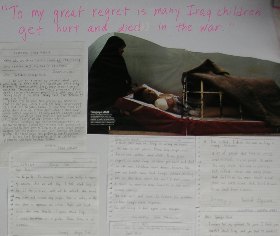|
Letters for Peace by Michele R. Steele (Gunma University) |
It was an honor to have had the opportunity to offer a poster session at the second annual Peace as a Global Language (PGL) conference at Seisen University in Tokyo. The poster session featured letters collected from a writing assignment given to students in a General English class I was teaching in January 2003.
Two months prior to the March 2003 invasion of Iraq, I asked my students to write letters either in support of, or in opposition to the war. I was interested in giving them an opportunity to consider for themselves how they felt about the impending war.
Image 1: Sample letters to President Bush (click to enlarge)
The students were all freshman at Gunma University. Their opinions regarding this issue were not influenced in any way by the teacher. In other words, my beliefs concerning this issue were not revealed at the time the assignment, nor was there any discussion either in favor or against the war. Students were simply asked to write letters either to President Bush or to Prime Minister Koizumi for or against the planned invasion. All letters were written in English.
The assignment was written on the board at the beginning of class, and briefly explained orally. The format for the writing of letters (i.e., how to begin and end a letter) was illustrated. A list of words was written on the board to assist the students. Words or phrases that might not be found in dictionaries were listed. Such phrases included "weapons of mass destruction" and "weapons inspectors." Also, relevant names were listed (i.e., Hussein, the United Nations). Often the words were written on the board after a student was heard asking another student how to express the Japanese word or phrase in English.
At the end of the assignment, 107 letters from two classes were collected. Of these, only eleven were addressed to Prime Minister Koizumi. Three of these eleven cited Japan's military history as reason to deny support for a U.S.-led war against Iraq. Not one of the letters to Koizumi was in support of war. Among the letters to President Bush, nine were written in support of the impending war. All other letters to Bush were against the war. (See Table 1)
Table 1. Letters to Koizumi/Bush supporting or opposing the 2003 invasion of Iraq
General Breakdown Number Received Percentage Letters to Koizumi in Opposition to the War 11 10.3% Letters to Koizumi in Support of the War 0 0% Letters to Bush in Opposition to the War 88 82.3% Letters to Bush in Support of the War 9 8.4% Did Not Write Letters 0 *.*%
It soon became apparent that there were six main reasons students gave for opposing the war. Less than 10% of the students gave reasons other than the six listed below.
[ p. 51 ]
- The war would result in injury or death of innocent victims. (42.1%,)
- There is no solid evidence as to whether the reputed weapons of mass destruction actually exist. (14%)
- The U.N. and various nations do not endorse the war (10.3%)
- The war would results in widespread environmental destruction. (3.7%)
- The war would harm U.S.-Arab relations. (2.8%)
- The war would amount to revenge for the Sept. 11, 2001 incident (1.9%)
Table 2 presents this information more graphically. Responses which did not use these six main rhetorical patterns, but were clearly in opposition to the war, were placed into a category labeled "other."
Table 2. A rhetorical analysis of the letters to President Bush
Rhetorical argument used Number Percentage The death of innocent victims 45 42.1% No weapons of mass destruction found 15 14.0% Lack of UN support 11 10.3% Environmental destruction 4 3.7% Adverse impact on Arab-U.S. relations 3 2.8% Revenge motive unwarranted 2 1.9% Other 7 6.5%
Image 2: Sample environmental concerns (click to enlarge)
The student letters were put on several large posters with related news clippings and presented at the PGL2 conference. Handouts about the classification of the letters were available at the display site. Visitors to the display seemed eager to ask questions and to discuss individual letters. One letter, in particular, was the focus of much attention. This letter appears below:
Dear Mr. Bush,
I think this war is good because it is showing to the world two truths for the world. One is the reality for the United States, the New Empire which makes the world enslaved for American riches. The second is that world history is religious wars. If there's two religions, there were wars in world history and now added one page of "History" of the world of wars. I think that is to believe is to kill because history was always bloody, and fanatics never disappear. The words "All people are equal under the name of God" means that people are not equal if "GOD" is different. So the empire of the United States is very dangerous for the world because it is controlled by the people that think good for the AMERICA is good for ALL the WORLD. And there is no power mightier than the United States that believes in power.
Sincerely,
T. Sato
 Image 3: Sample letters about civilian casualities (click to enlarge) |